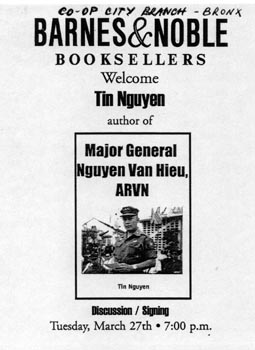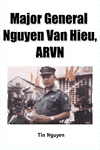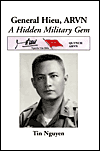
The book format of General Hieu's Page is available at (starting date):
|
1st Edition (discontinued)
|
2nd Edition (revised and expanded)
|
|
|
|
|
+ by Dr Michael JM Raffin (The Viet Nam War Museum)
The museum is pleased to announce a new acquisition Major General Nguyen Van Hieu, ARVN which joins us here with our previous book reviews for: Monkey Bridge by Lan Cao, and History of the Vietnamese Marine Corps, Army of the Republic of Viet Nam by Colonel Pham Van Chung.
This text presents an illuminating perspective into the highest Vietnamese traditions, and is a fitting posthumous tribute to a ranking member of South Viet Nam's highest military cadres. Written as a sibling biography, it is richly peppered throughout with mild bias, something freely if not proudly acknowledged by the author, which nevertheless does not detract from the wealth of objective information, data that is only enriched by a personal, if family-oriented point of view.
This book extolls the virtue of Vietnamese tradition with the highest esteem, as exemplified in this in-depth analysis of one man's contributions to his motherland, against the backdrop of one of southeast Asia's most tragic and sad chapters in history.
Factual information is well presented, with adequate supporting documentation, and numerous pictures give this historical personage a very vivid and intimate familiarity. The details of some of the information presented can be simultaneously revealing and startling. This book is well-balanced in the extremes: One man's virtues and rapid progression through the military ranks being consistently contrasted with the insidious prevalence of corruption or corrupt practices by the government which he is sworn to protect. The admiration of the author for the Major General lies in stark contrast to the shameful behaviors of so many government officials at all levels, including the presidency, which must bear the brunt of the responsibility for the eventual downfall of the government of the Republic of Viet Nam.
"I am only the instrument of my brother. General Hieu's biography is a self-expression ... General Hieu drew a clear-cut line between the two military and private life areas. This explains why he was able to maintain his integrity and virtue while working with other corrupt and low-moral generals ... The majestic aura that soldiers perceived in General Hieu's personality came from his inner strength, not from an artificial majesty requiring the use of a general's baton, or a combat camouflaged outfit, or a cigar, or an imposing guard detail, etc... And thus they genuinely respected and loved him dearly ... "
General Hieu was assassinated in his office headquarters on 8 April 1975. Except in the fact that he was shot to death, official reports and eyewitness testimony remaine internally contradictory.
+ by Francis Tri Nguyen
This biography, a reader would notice at the outset, was not written by a historian, an investigative reporter, or a professional biographer. It originates instead from the pen of a younger sibling seeking to resolve the mystery surrounding his brother's untimely death. This legitimate curiosity has evolved into a collection of articles depicting General Hieu as a family man, a patriot, a military strategist, and a man of integrity.
This collection of articles authored by siblings, friends and fellow military men unexpectedly converges to project a dynamic image of an intelligent soldier and brilliant strategist engaged in the twofold quixotic tasks of overcoming a corrupted military hierarchy and fighting the invading North Vietnamese communist army.
The book presents the reader with glimpses of a man living the yin aspect of the Vietnamese society (egalitarian, flexible, spiritual, congenial) and, at the same time, confronting the yang aspect of the neo-Confucianist military and government hierarchy (male dominant, rigid, self-serving, elitist, concerned with face and status).
Without any claim to being systematic or thorough in his research, the author has nevertheless gathered a number of revealing personal anecdotes, testimonies from living witnesses, declassified documents from the National Archives, letters from former military academy classmates, phone interviews, excerpts from books, and so forth. From this cacophony of voices emerges the image of a virtuous man, caring father, loving spouse, and competent general respected by Vietnamese and American military personnel of all ranks. The reader would no doubt be surprised to discover this unsung hero in the stark background of negative memories of the Vietnam War and betrayal of the people by the neo-Confucianist military and government hierarchy.
Though modest in its presentation, the book managed to do justice to a dedicated soldier and competent general, who was mostly unknown to both the Vietnamese and the American public. After reading this fascinating biography, the reader comes away wondering what might have been had this uncommon general, who epitomized the true Vietnamese people, been allowed to fully exercise his military competence.
+ by Thomas F. Marcotte
I finished the book on General Hieu and found it very interesting. Having served in 3 Corps and being deeply involved in Vietnamization I was reminded of the challenges involved in that area. The author provides insights and background which are both interesting and helpful.
My own suspicion is that General Hieu was not assassinated by his fellow officers but murdered by the NVA prior the final offensive in 3 Corps. It is a legitimate military objective to remove the command structure of an opponent. The NVA with no Air Force and limited Artillery used assassination to great effect throughout the war. I do agree that there was an attempt at a cover-up. It is a significant loss of face to have such poor security at a headquarters that your two star gets whacked right under your nose. Additionally, I suspect that it was an inside job assisted by traitors within the ARVN. These traitors and spies are also always part of any military operation and the NVA and VC were exceptionally good at infiltration. Who these people were and at what level in the HQ they were operating is anybody's guess.
That General Hieu was assassinated for exposing corruption is in my opinion doubtful. By April 1975 the ill gotten money was probably already out of the country. Had it occurred earlier I would be more inclined to agree. Finally you can't discount the idea that he accidentally shot himself. I damn near did the same thing while cleaning my pistol in 1969. I failed to insure the gun wasn't loaded, pointed it at a wall and pulled the trigger. BOOM...big hole in the wall and much cursing from those on the other side, who I fortunately missed.
The infantry armor tandem is too long to discuss here, but the use of foot soldiers and cavalry together is militarily as old as horses and men.
I thought it interesting when I heard a report that 60% of the population in Viet Nam was born after the war. The whole experience is rapidly becoming abject history for all except the participants. The story of General Hieu is a good one and the book contributes effectively to the history of the Viet Nam war.
+ by Douglas Pike (Indochina Chronology - Vietnam Center)
Biography of a South Vietnam general officer who has been likened to Patton, Rommel, Montgomery, and LeClerc. He was much admired by Vietnamese civilians and respected by his American advisors. If there had been more like him, the author believes, the South would have won the war.
+ by Darryl Nelson (posted on Counterparts website, 12 June 2001)
General Hieu as an unsung hero, in times that heroes were scarce I would encourage everyone to pick up a copy of this book and read it. It sheds light on the ARVN Forces never before told.
+ by James Miguez
I have read your book more than once and it is filled with so many facts that sometimes one is hard put to keep all the information in mind at one time. I do think that there is enough information to come to some certainties, one of which was that your brother was at the top of the ARVN leadership in terms of capabilities, powers of execution, and personal integrity and trust. Also, his career assignments which you have documented bear this unbiased character judgment out: 1) his Chief of Staff assignments, 2) leadership in Hue during the historic Diem coup, 3) his divisional commands, 4) his long partnership with Gen. Do Cao Tri, the most popular and successful general in the heyday of ARVN victoriousness, 5) his time as Anti-Corruption Minister, a step in the direction of a full-time and prominent cabinet position, 6) the last years of his life are spent working on the corps level as deputy commander, and especially that of the Third Corps which included the defense of Saigon, the Capital, 7) posthumously promoted to Lieutenant General.
Of course there are testimonies from subordinates as to his action on the field, as well as general outlines as to his guiding spirit behind the strategies of the Cambodian campaigns. I do not see how anyone studying the Vietnam War on the ARVN side can neglect your book at all.
 This book (1st edition) is advertised at:
This book (1st edition) is advertised at:
* Atrium Books
* BookFinder.com
* BookFinder4U.com
* BooksAboutVietnam.com
* Counterparts
* ISBN.nu
* MilitaryReadingList.com
* Olive-drab
* SaigonInfo.com
* The Vietnam War Museum
* USMC Vietnam-ARVN Boot Camp
* Vietnam War Bibliography (Edwin E. Mo´se)
* VietnamWar.net
* Vietnam War Books
* Vietnam War Writers
* Vietnam Yesterday and Today

